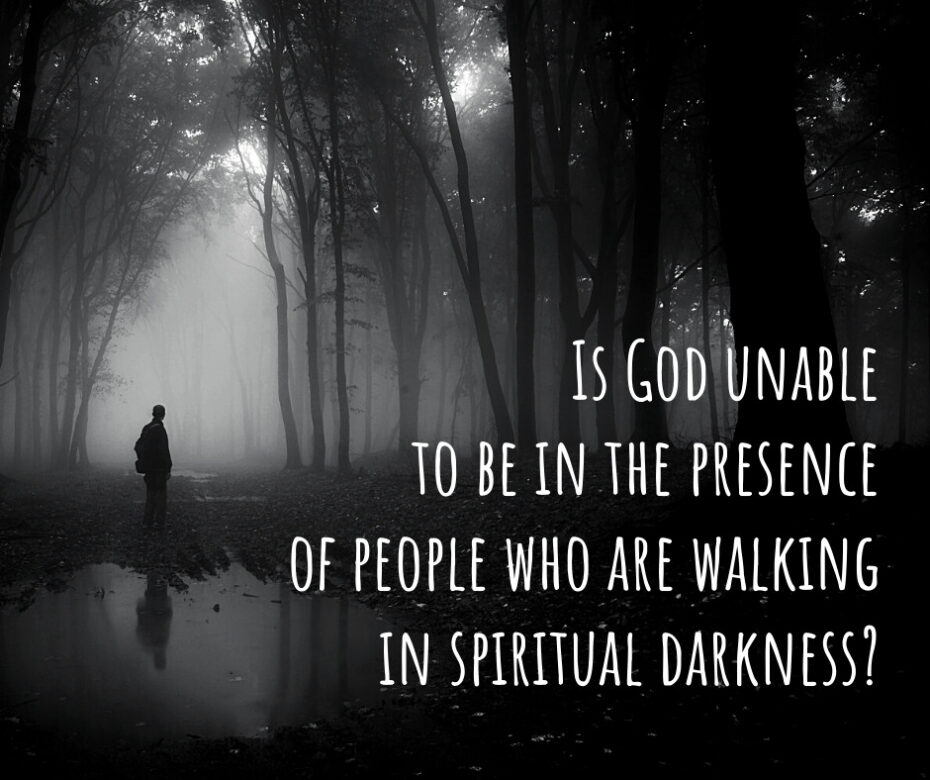This good question just came in from a radio listener:
In a book I read my children, it says “God is perfect and holy and anyone who sins cannot be in His presence.” I know this is a concept I have been taught somewhere else before. I heard it brought up in passing on one of your radio shows (it had nothing to do with the topic). Is this a concept taught in the Bible? And if so, how come in the Book of Job, Satan was able to appear before God? And isn’t God everywhere (around us sinners)? Does it say or suggest in the Bible that God cannot be around sin or sinners? Thank you.
I am impressed both by the question and way in which the interrogator answers it herself.
I agree.
The evidence she cites is some I was going to cite. Yes, in Job 1:6 and 2:1 we find that “the sons of God came to present themselves before the Lord.” Then Job adds, “and Satan also came among them.”
The “sons of God” refers to angels. This probably refers to unfallen angels. However, in Gen 6:2, “the sons of God” refers to fallen angels. Compare 2 Pet 2:4. At the very least, the chief fallen angel, Satan, was allowed in God’s presence. Possibly some of his followers were present as well.
Job 1:6 and 2:1 prove that God can be in the presence of sinners.
Plus, God’s omnipresence means that God has been in the presence of sinners since the fall of one third of the angels. He will always be in the presence of sinners (Heb 4:13).
Think about the Great White Throne Judgment in Rev 20:11-15. All unbelieving sinners of all time will be judged by Christ. While I think the judgment likely occurs on earth, it is certainly true that God the Father and God the Holy Spirit will be watching the proceedings. If God cannot be in the presence of sinners, then there can be no judgment of sinners.
Believers still sin (1 John 1:8, 10). So if God can’t be in the presence of sinners, then He cannot have fellowship with believers.
The Bible nowhere says that God cannot be around sin or sinners. If that were so, then the incarnation never could have happened. Jesus is God (John 1:1), that is, the second member of the Trinity. He was around sinners all the time.
I’ll add a question of my own: Why do many say that God cannot be in the presence of sinners? They say that because they misunderstand a few passages.
Here are a few of those texts and my brief explanations.
“You [God] cannot look upon wickedness” (Hab 1:13a). The prophet is disturbed that God has showed him that wicked Babylonians (Chaldeans) will be attacking Israel and taking it into exile. His point is not that God does not see wickedness. It is that He does not look favorably upon the wicked. Note Hab 1:13b, “Why do You look on those who deal treacherously?” He is asking why God would allow the Babylonians to destroy Israel.
“As far as the east is from the west, so far has He removed our transgressions from us” (Ps 103:12). This does not mean that God cannot see us unless we are sinless. It means that when He forgives, our forgiven transgressions do not bar us from fellowship with God. But even if we are out of fellowship with God, He sees us and is wooing us back to Himself (Luke 15; Jas 5:19-20).
“My God, My God, why have You forsaken Me?” (Matt 27:46). That is a quote of Ps 22:1. The Lord Jesus is not saying that God has ceased to see or hear Him because He was now bearing the sins of the world. If God could no longer see or hear Him, then this cry would make no sense. Instead, the Lord is calling the attention of those at the cross to Psalm 22. By citing the opening words, He was citing the whole Psalm. It begins with a reference to the cross but ends with the triumphant reign of Messiah (vv 29-31). So that is not only a cry of pain and suffering, but also a statement that He went to the cross of His own volition and that He knows that these next six hours will be the most victorious hours in all of history.


